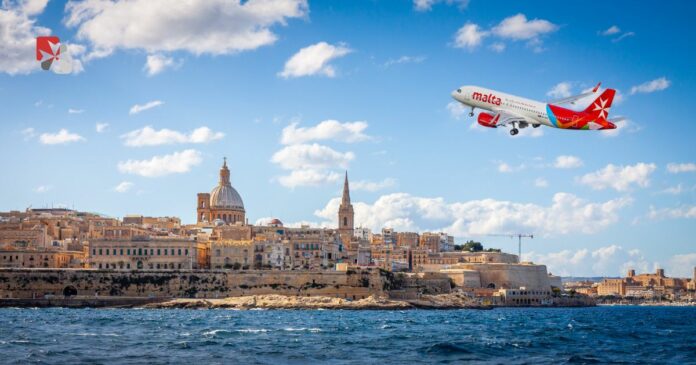In the government’s plans, the creation of KM Malta Airlines, the new Maltese airline, should bring positivity in terms of sustainability, tourism and economic prospects.
At the heart of the Mediterranean, the Maltese archipelago is about to experience a new chapter in the aviation industry. It was recently announced that the country’s historic national airline, Air Malta, will close its operations to make way for a new entity: KM Malta Airlines.
This was in response to the failure of negotiations between the Maltese government and the European Commission, which led to the blocking of the EUR 290 million funding that the Maltese government had planned to support the airline. The new company, with the Maltese government as sole shareholder, will start operations in March 2024, connecting Malta to seventeen routes across Europe.
The Conflict with Brussels
As early as 2010, the company needed a EUR 50 million loan authorised by the European Commission. After years of negotiations, a restructuring plan was approved with the allocation of EUR 130 million by Brussels. However, this rescue had conditions: Air Malta had to become profitable in the long term and take measures to reduce its dependence on state support. Since a solution for the capitalisation of the company could not be found, Brussels and the Maltese government decided to end the funding and replace Air Malta. This is reminiscent of what happened in Italy, with the transition from the national airline Alitalia to Ita Airways.
Innovation and Sustainability as priority in the creation of KM Malta Airlines
KM Malta Airlines, which will commence operations in March 2024, will inherit the strengths of Air Malta, focusing in particular, on long-term financial sustainability. The Minister of Finance and Development, Clyde Caruana, said recently, that the Maltese government has been working closely with international industry experts to develop a new business plan based on an efficient network and a well-planned fleet.
In terms of routes, Sabre has played a key role in designing a system that connects Malta to European capitals and major airports on the continent and beyond. This will ensure unprecedented commercial efficiency. The company will operate a total of seventeen routes using eight Airbus 320Neo aircraft, known for their low fuel consumption and reduced CO2 emissions per passenger. This commitment to sustainability is not only an environmental benefit, but also an important goal for the Maltese government.
The issue of aviation sustainability is of fundamental importance to Malta, and Minister Caruana emphasised that KM Malta Airlines is expected to align its policies with the UN Sustainable Development Goals and the requirements of the European Union’s Green Deal and ‘Fit for 55’ targets to mitigate environmental impacts. This initiative reflects the growing recognition of the importance of reducing the environmental impact of airlines and taking concrete actions to address climate change.
Economic and Tourist Implications
The creation of KM Malta Airlines is expected to have a significant impact on the Maltese economy and tourism sector. Malta is a popular tourist destination, attracting visitors from all over Europe and beyond. The availability of direct flights and efficient connections is crucial for the country’s tourism sector and the new airline is expected to contribute to improving the island’s connectivity, facilitating travel for tourists and stimulating tourism.
Furthermore, KM Malta Airlines’ sustainability-oriented approach could be a significant competitive advantage. Many travellers are increasingly aware of the environmental impact of their travels, and an airline offering environmentally friendly flights could attract an environmentally conscious clientele.
From an economic perspective, the Maltese government’s decision to become the sole shareholder of KM Malta Airlines indicates a long-term commitment to the development of the country’s aviation industry. This could translate into sustained investments in airport infrastructure and air fleet, promoting employment and economic growth. The new airline will also face challenges and opportunities in the European aviation market, including competition with other airlines and the ability to attract customers.
The creation of the new company marks a new beginning for the Maltese aviation industry. This decision, although forced, was hopefully driven by a combination of financial and environmental considerations, with a strong commitment to sustainability.





